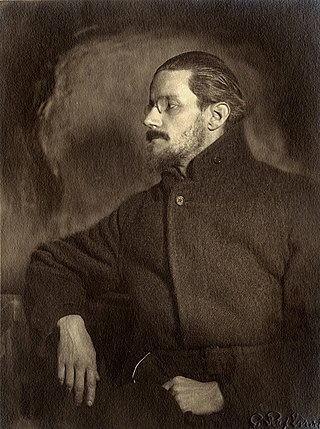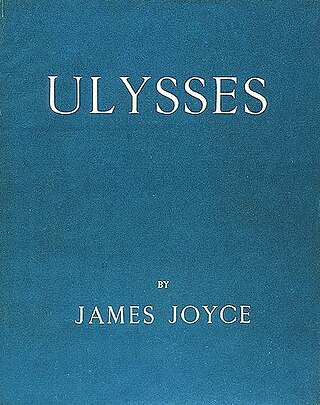Related Research Articles

James Augustine Aloysius Joyce was an Irish novelist, poet and literary critic. He contributed to the modernist avant-garde movement and is regarded as one of the most influential and important writers of the 20th century. Joyce's novel Ulysses (1922) is a landmark in which the episodes of Homer's Odyssey are paralleled in a variety of literary styles, particularly stream of consciousness. Other well-known works are the short-story collection Dubliners (1914), and the novels A Portrait of the Artist as a Young Man (1916) and Finnegans Wake (1939). His other writings include three books of poetry, a play, letters, and occasional journalism.
Ulysses is one form of the Roman name for Odysseus, a hero in ancient Greek literature.

Ulysses is a modernist novel by the Irish writer James Joyce. Parts of it were first serialized in the American journal The Little Review from March 1918 to December 1920, and the entire work was published in Paris by Sylvia Beach on 2 February 1922, Joyce's fortieth birthday. It is considered one of the most important works of modernist literature and has been called "a demonstration and summation of the entire movement".
In literary criticism, stream of consciousness is a narrative mode or method that attempts "to depict the multitudinous thoughts and feelings which pass through the mind" of a narrator.

Leopold Bloom is the fictional protagonist and hero of James Joyce's 1922 novel Ulysses. His peregrinations and encounters in Dublin on 16 June 1904 mirror, on a more mundane and intimate scale, those of Ulysses/Odysseus in Homer's epic poem: The Odyssey.

Bloomsday is a commemoration and celebration of the life of Irish writer James Joyce, observed annually in Dublin and elsewhere on 16 June, the day his 1922 novel Ulysses takes place on a Thursday in 1904, the date of his first sexual encounter with his wife-to-be, Nora Barnacle, and named after its protagonist Leopold Bloom.
This schema, or explanatory outline, for the novel Ulysses was produced by its author, James Joyce, in 1920 in order to help a friend understand the fundamental structure of the book. The schema has been split into two tables for better ease of reading.

A Portrait of the Artist as a Young Man is the debut novel of Irish writer James Joyce, published in 1916. A Künstlerroman written in a modernist style, it traces the religious and intellectual awakening of young Stephen Dedalus, Joyce's fictional alter ego, whose surname alludes to Daedalus, Greek mythology's consummate craftsman. Stephen questions and rebels against the Catholic and Irish conventions under which he has grown, culminating in his self-exile from Ireland to Europe. The work uses techniques that Joyce developed more fully in Ulysses (1922) and Finnegans Wake (1939).

Dubliners is a collection of fifteen short stories by James Joyce, first published in 1914. It presents a naturalistic depiction of Irish middle class life in and around Dublin in the early years of the 20th century.

Molly Bloom is a fictional character in the 1922 novel Ulysses by James Joyce. The wife of main character Leopold Bloom, she roughly corresponds to Penelope in the Odyssey. The major difference between Molly and Penelope is that while Penelope is eternally faithful, Molly is not. Molly is having an affair with Hugh 'Blazes' Boylan. Molly, whose given name is Marion, was born in Gibraltar on 8 September 1870, the daughter of Major Tweedy, an Irish military officer, and Lunita Laredo, a Gibraltarian of Spanish descent. Molly and Leopold were married on 8 October 1888. She is the mother of Milly Bloom, who, at the age of 15, has left home to study photography. She is also the mother of Rudy Bloom, who died at the age of 11 days. In Dublin, Molly is an opera singer of some renown.

Blooms of Dublin is a musical play or operetta in two acts with music and text by Anthony Burgess. The work, nearly three hours long, was first performed for the Dublin Joyce Centenary in 1982 by the RTE Singers and RTE Concert Orchestra and broadcast on BBC and RTE radio. It was produced by John Tydeman and Michael Heffernan.

Our Exagmination Round His Factification for Incamination of Work in Progress is a 1929 collection of critical essays, and two letters, on the subject of James Joyce's book Finnegans Wake, then being published in discrete sections under the title Work in Progress. All the essays are by writers who knew Joyce personally and who followed the book through its development:
Arthur Stuart Ahluwalia Stronge Gilbert was an English literary scholar and translator. Among his translations into English are works by Alexis de Tocqueville, Édouard Dujardin, André Malraux, Antoine de Saint-Exupéry, Georges Simenon, Jean Cocteau, Albert Camus, and Jean-Paul Sartre. He also assisted in the translation of James Joyce's Ulysses into French.
United States v. One Book Called Ulysses, 5 F. Supp. 182, is a landmark decision by the United States District Court for the Southern District of New York in a case dealing with freedom of expression. At issue was whether James Joyce's 1922 novel Ulysses was obscene. In deciding it was not, Judge John M. Woolsey opened the door to importation and publication of serious works of literature that used coarse language or involved sexual subjects.

Francisco García Tortosa was a Spanish University Professor, literary critic, and translator into Spanish. In Spain García Tortosa is considered one of the chief experts on the figure and work of the Irish writer, James Joyce, whose creations he has translated and about which he has published a wide range of studies. The Irish hispanist, Ian Gibson, has called García Tortosa «Spain's leading expert on Joyce», while considering his translation of Ulysses, in collaboration with María Luisa Venegas, as «prodigious».
Les lauriers sont coupés is an 1887 novel by French author Édouard Dujardin, first published in the magazine Revue Indépendante. He was an early user of the literary technique stream of consciousness, and Les Lauriers exemplifies the style. Dujardin claimed later, in a study of the technique and its application in Ulysses (1922) by James Joyce, that he was the first to use it in Les Lauriers.
The obscenity trial over the publication of James Joyce's Ulysses in The Little Review, an American literary magazine, occurred in 1921 and effectively banned publication of Joyce's novel in the United States. After The Little Review published the "Nausicaa" episode of Ulysses in the April 1920 issue of the magazine, the New York Society for the Suppression of Vice instigated obscenity charges against Little Review editors Margaret Caroline Anderson and Jane Heap. The editors were found guilty under laws associated with the Comstock Act of 1873, which made it illegal to send materials deemed obscene through the U.S. Mail. Anderson and Heap incurred a $100 fine, and were forced to cease publishing Ulysses in The Little Review.
William York Tindall (1903–1981) was an American Joycean scholar with a long and distinguished teaching career at Columbia University. Several of Tindall's classic works of criticism, including A Reader's Guide to James Joyce and A Reader's Guide to Finnegans Wake are still in print. He wrote a total of thirteen books on UK and Irish writers including Joyce, Dylan Thomas, W. B. Yeats, and Samuel Beckett. Indeed, Tindall nominated Beckett for the Nobel Prize in Literature; Beckett was the 1969 laureate.

Akram Pedramnia is an Iranian-Canadian writer, translator, Joycean scholar, researcher, activist, and physician. She has written, researched, and translated many English novels and political articles. She has resided in Canada since 1998, when she emigrated from Iran.
References
- ↑ Gilbert, Stuart (1952). James Joyce's Ulysses: A Study (2 ed.). Knopf. p. 30.